 It explains the details of the contribution, including the amount, the date, and the donor’s contact information. It can also confirm whether Arms of Hope will direct the donation to a program of the donor’s choice. Donors use this donation receipt to claim a deduction on their tax returns.
It explains the details of the contribution, including the amount, the date, and the donor’s contact information. It can also confirm whether Arms of Hope will direct the donation to a program of the donor’s choice. Donors use this donation receipt to claim a deduction on their tax returns.
Table of Contents
What is Arms of Hope?
Arms of Hope is a Christian 501(c)(3) organization that assists single mothers and their children avoid abuse, homelessness, neglect, and poverty. It is based out of Medina, TX, with outreach locations in Dallas, Denton, Forth Worth, Houston, Quinland, and San Antonio. It claims to be “strongly committed” to developing the spiritual lives of mothers and children participating in its programs. Arms of Hope doesn’t receive federal or state funding. In 2021, Arms of Hope
- Offered 6,000 hours of professional therapy;
- Served over 2,400 individuals;
- Staffed 742 volunteers who completed over 15,000 volunteer hours; and
- Supported forty-nine (49) degrees, educational certificates, GEDs, and graduates.
How to Donate (6 Steps)
Step 1: Online Donation Portal
Visit the Arms of Hope online donation portal. Select the donation amount and designation. Designation options are the Boles Campus, Medina Campus, Outreach Programs, and Together Program. Also, choose whether to donate monthly. 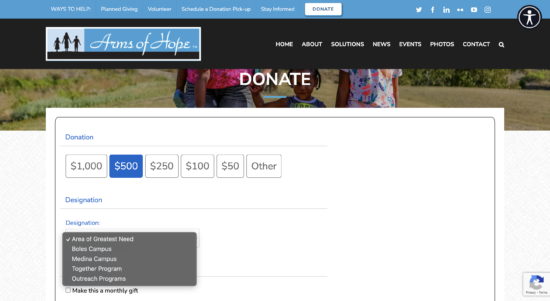
Step 2: Tribute Gift and Donor Information
Select whether the donation is in honor of another person. There is an option to leave a personal comment with the contribution. Then enter the donor’s contact information, including phone, email, and mailing address. 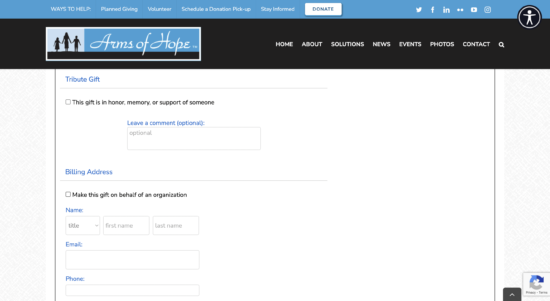
Step 3: Payment Method
Select whether to contribute anonymously. Then choose a payment method: credit card or direct debit. For these instructions, we will use the credit card payment method. 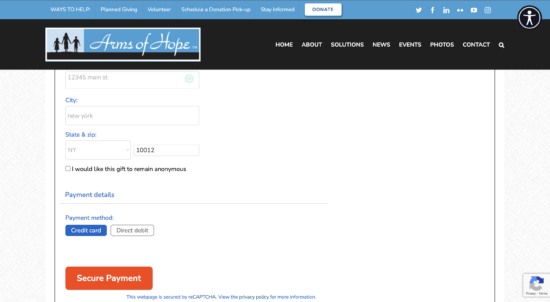
Step 4: Credit Card Type
Next, select payment by card, PayPal, Venmo, or mobile wallet. For these instructions, we’ll continue with a traditional credit card payment. 
Step 5: Billing Information
Re-enter the donor’s email address and add the billing address associated with the credit card. 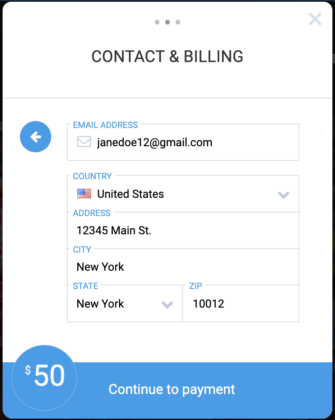
Step 6: Finish and Pay
Enter the credit card number, expiration date, and CSC number. Click “Finish and pay” to submit the donation. 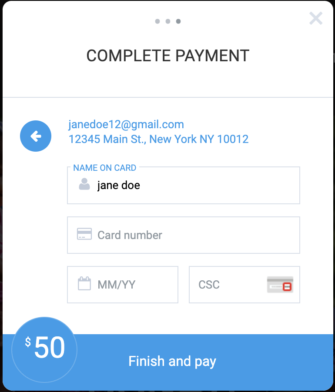
Other Ways to Donate
Bargain Sale – Sell a piece of property to AOH for less than fair market value (FMV) in cash and claim a deduction for the difference between the sale price and FMV. Beneficiary Designations – Complete a beneficiary designation form provided by the account or insurance provider. Bequest Through a Will or Trust – Include language specifying a gift to be made to AOH as part of the estate plan. Cash – Mail a check or money order with the donation’s purpose indicated in the memo line or an attached letter. Charitable Gift Annuity – Transfer cash or property to AOH, and in exchange, AOH will pay fixed payments to the donor for life. IRA Charitable Rollover (not tax-deductible) – Contact the IRA administrator directly to set up the gift. Life Estate Reserved – Deed the property to AOH with a provision that allows the donor to continue to live in the home for the rest of their life. At the end of their life, AOH takes possession of the property. Life Insurance – Complete a beneficiary designation form provided by the insurance policy provider. Real Estate – Execute a deed transferring ownership to AOH. Retirement Assets – Complete a beneficiary designation form provided by the retirement plan provider. Stocks & Bonds – Send by electronic transfer or certified mail.
Where Does the Money Go?
In 2009, the Boles and Medina Children’s Homes combined forces to create Arms of Hope. Both facilities are still in operation. The College and Career Program assists Arms of Hope high school graduates, including support through college, first jobs, trade schools, and accommodations for graduates without permanent housing. The Family Outreach Program is only available in Dallas, Denton, Houston, and San Antonio. It provides the following services to single-mother families:
- Assistance with groceries, rent, and utilities;
- Christian-based counseling services;
- Church community;
- Life skills training (budgeting and parenting skills); and
- Networking and referrals to other helpful organizations.
The Residential Child Care program houses children ages five through eighteen (5-18) in cottages of eight to ten (8-10) children and “houseparents.” This program provides clothing, education, food, medical care, shelter, and supervision to children in families actively struggling with any of the following conflicts:
- Abandonment;
- Alcohol abuse;
- Death;
- Drug abuse;
- Homelessness;
- Illness;
- Incarceration;
- Poverty;
- Violence.
The Right Start Program provides prenatal necessities, skills to care for a newborn, and shelter to expecting mothers in need. The Together Program assists mothers having difficulty providing for their children’s physical needs. Mothers must seek education or job training to pursue financial independence and be willing to participate in spiritual activities and worship regularly. All of the following services are available for mothers and children in this program:
- Education;
- Case management;
- Counseling;
- Home within range of public schools;
- House necessities;
- Parenting and life skills training;
- Psychological testing; and
- Spiritual activities.
